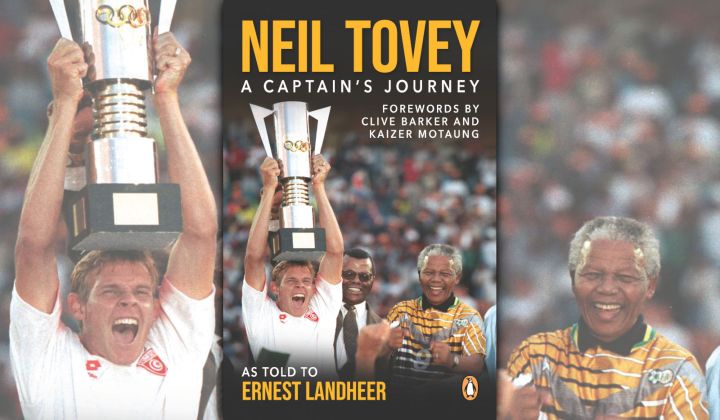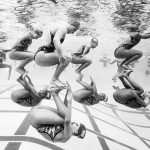BOOK
Tovey dribbles… he shoots… he writes!

Maverick Life Exclusive: Interview with former Bafana Bafana captain Neil Tovey on his new book, A Captain’s Journey
‘This book is the life story of one of the great legends of South African soccer. It’s about true leadership, his passion for the game of football and his love for his country.’ So says Kaizer Motaung of Neil Tovey, who led Bafana Bafana to Africa Cup of Nations glory in 1996. The Reading List sat down with Tovey to discuss this and other moments from his storied football career, detailed in his new memoir, A Captain’s Journey.
The Reading List: You mention in the book that your parents read a lot, did that reading bug get passed on to you? Did you read any sports biographies in preparation for this book?
Neil Tovey: Unless it’s football, I’m not the best of readers. But Ernest Landheer, the co-author of the book, was immensely helpful in the whole process. He did his homework. His attention to detail is great and he pushed me along on a lot of things, you know, which jogged my memory a bit and that helped. And my hope is that the book is not only good for footballers, but that people can take a lot of life skills out of it.
TRL: You mention in the book that you were close to signing for Jomo Sono’s Jomo Cosmos before you joined Kaizer Chiefs. I think that revelation surprised Amakhosi fans. How do you think your career would have turned out if that had happened?
Neil Tovey: Ja, there was a little bit of interest all round. But I think because of the enormous size of the club, I made a hundred percent the correct decision for my career to join Chiefs. Definitely. And settling in at a club like that, having my brother Mark there already helped matters as well. In fact, as I say in the book, he played a major role in my joining Chiefs.
TRL: You were quite the goal scorer in your younger days.
Neil Tovey: I used to play in midfield and more up front, and then slowly I got older and got moved further back [laughs].
TRL: You also mention how your training sessions under Clive Barker at Durban City early in your career would be centred around scoring goals, which you see as very valuable.
Neil Tovey: It’s an important factor and I think a lot of teams nowadays don’t do enough of that. Playing those small-sided games at training that always have a lot of goals, it’s so, so important. And the actual process of defending, attacking and scoring goals is done by everyone in a small-sided game, which is also very important. Those small-sided games then play out in all areas of the pitch during a match, and you’ve got to be sharp, whether you’re defending or a goalkeeper. If you’re in a 20 by 30 area, goalkeepers will sharpen up, defenders will be turned, defenders win the ball back, there’s a quick little pass and then you can have a shot at goal. And if you’re taking shots at goal regularly in those areas, it’s bringing every aspect of the game into play, whether you’re defending, attacking or in transition.
TRL: You also mention how football is a psychological game that “depends heavily on your mindset”. I suppose if you’re scoring a lot of goals in training, that gives you confidence.
Neil Tovey: Yes, it becomes natural, and that element becomes natural to any player of the game. It’s not just pertaining to strikers doing the finishing in front of goal, everybody is doing finishing, whether you’re a fullback, centre-half or whatever.
TRL: Goal scoring has been a perennial problem in the PSL and for our national team. What advice would you have for Bafana Bafana during the Africa Cup of Nations?
Neil Tovey: Well, they’re quietly under the radar, and I think they should stay under the radar as long as possible, because when they get to the knockout stages then obviously they’ll get noticed. I think if they go quietly about their business it’ll be better. You saw the cricketers, how they battled with the pressure.
TRL: Ahead of Bafana’s first international in 1992, against Cameroon, you, as captain, told the players: “We have nothing to lose, in a sense, as they know nothing about us.” Do you think this naivety contributed to South Africa’s sporting successes in the early days of democracy?
Neil Tovey: It takes away the pressure because no one is expecting anything of you, no one knows what to expect at the end of the day, so I suppose it did work to our benefit. And I think the same thing is happening now again with Bafana. There is less expectation at the moment, about Bafana, and that can assist them. Obviously that’ll change as they go through, even to the knockout stages, but early on, the way our sport has been the last couple of months, no one is expecting anything, to be honest.
TRL: You mention in the book that at a big club like Chiefs, players often start well, but after one or two bad games the pressure quickly builds. How did you overcome that? You seem to be the kind of player that thrives under pressure.
Neil Tovey: Yes, you know, some players will, some players being given a leadership position makes them better. Some people can handle it, some people can’t, it’s drive and determination, I think. And also your make-up, and how you were brought up. If you’re brought up not to expect anything to be given to you, you have to learn to work for it.
TRL: You were assistant coach to “Shakes” Mashaba when Banyana Banyana won the Cosafa Cup in 2002. What did you make of their performance at the recent Women’s World Cup?
Neil Tovey: Banyana have improved immensely over the last little while. Yes, it was our first World Cup, but things are starting to progress nicely for Banyana. Their biggest problem is the level of professionalism in the team, for want of a better word, because you have to understand a lot of them come from clubs that only train twice a week, and the kind of training they get at those clubs could probably be a lot better. So the new national women’s league that Safa is planning will hopefully close that gap, or will narrow that gap, between the [provincial] Sasol Women’s League and the national women’s team. Having training more often, with a higher standard of training, hopefully will improve all the players.
TRL: I am quite impressed with the continuity in our national women’s team set-up.
Neil Tovey: Yes, they have got a lot of players with loads of caps and experience, so that’s also helped them. But like all our teams they just need to get up to that next level and manage big game moments better. And if Bafana can manage the big game moments, then they will also do well.
TRL: I’m hoping that Percy Tau will be that kind of player for Bafana Bafana.
Neil Tovey: Yes, that’s what you need, like in the game against Libya [in the Africa Cup of Nations qualifiers], Percy took the initiative and got key goals at key moments. That’s not going to change in any big tournaments. You have to play tournament football consistently, and your goalkeeper has got to make the saves at the right time, defenders have to make important tackles, and the clinical passes and the strikes on goal have got to be on point. You saw Morocco got given a lifeline in the final minutes of their opening match in the Afcon – they put the ball in the right area for the free kick, and made things happen.
TRL: In the book you mention that as a coach your focus is always on winning the next game. How does that philosophy blend with Safa’s Vision 2020 plan?
Neil Tovey: You can only control things that are manageable. There will always be aspects of your life and aspects of your career that you can control yourself, and there will be others that you can’t control yourself. And if you waste your energy on areas that you can’t control then you’re wasting your time.
TRL: As technical director of Safa, part of your mandate is football development, and I was very interested to read about the football-focused schools that are planned. Can you tell me a little more about them?
Neil Tovey: The soccer schools are very, very important in the association. They are going to be critical, because those are your lead players coming through the age groups, and if you teach them the correct way then your national teams will be better, and your PSL teams will be better.
TRL: Your book also covers your recent health scares, which included two heart attacks. I was touched by the story of the cyclist who stopped during the Amashova Durban Classic cycle race to help you when you were having chest pains ahead of your second heart attack – have you managed to find him?
Neil Tovey: I haven’t, I have no idea who he was, and I wish I had his number.
TRL: I was wondering if he had read the book and recognised himself. That would be a nice end to the story.
Neil Tovey: My wife was going to give him my bike, that day, just to say thank you. I might end up with five or six people who say they are him! But I do wish I could meet him one day to thank him for saving my life. ML
About the Book
South Africans of all races remember the moment when Neil Tovey raised the Africa Cup of Nations trophy in 1996, with Nelson Mandela at his side wearing his number 9 jersey. It still represents South Africa’s greatest success in international football.
In A Captain’s Journey, his long-awaited autobiography, Tovey tells his fascinating life story, describing his modest upbringing in Durban, his entry into a mainly black sport in a deeply segregated 1980s South Africa, and his time as captain of Kaizer Chiefs and Bafana Bafana. He recalls his introduction to “muti” rituals by team members and his growing popularity among Chiefs supporters, who nicknamed him Mokoko (boss chicken).
Tovey also writes about his experiences as a coach and as technical director of the South African Football Association (Safa), and shares his insights about the state of the sport today. He talks frankly about his family life and about surviving two heart attacks, and gives insights into leadership and success.
This book will appeal to all football fans, but it is also a fascinating story of a man who has lived a truly South African life.
Visit The Reading List for South African book news, daily.
















 Become an Insider
Become an Insider